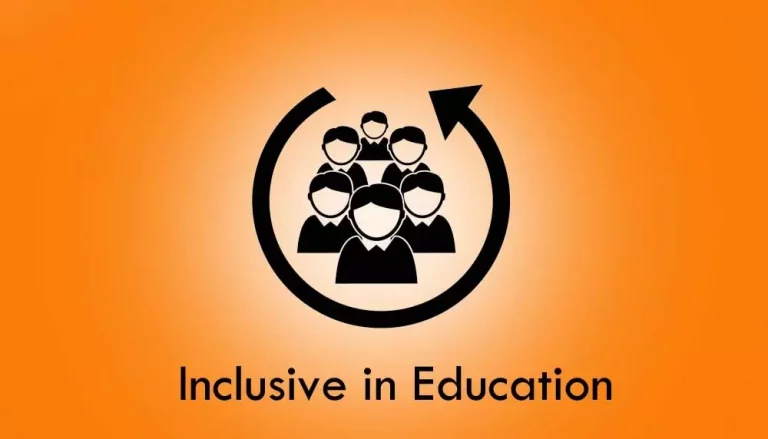When most people think about what is inclusive in education, they think of traditional schools with desks in neat rows, a chalkboard at the front of the classroom and a teacher at the front of the room.
However, there are many types of education.
Inclusive education is one of those types. So, what is inclusive in education? In this post, we’ll define inclusive education, discuss who it’s for and outline some of the benefits of attending an inclusive school.
What is inclusive in education?
Inclusive education is a term that is used to describe a type of schooling that meets the needs of all students.
This can be done in a variety of ways, but it typically means that the school has a curriculum that is designed to be accessible to all students, regardless of their abilities or disabilities.
Suggest: Importance of education
Inclusive education also means that the school provides a supportive environment where all students feel welcome and respected.
Teachers and staff are trained to work with students who have disabilities, and they are encouraged to create a classroom community where everyone feels like they belong.
The Need for Inclusive Education
All students, regardless of their ability or disability, should have access to a quality education. That’s what is inclusive in education is all about.
Inclusive education means that all students are welcome in the classroom and that the school curriculum and environment are designed to meet the needs of all learners.
It’s about providing an education that is accessible and welcoming for every student, no matter what their background or ability.
The need for inclusive education is more urgent than ever.
With an increasing number of students living with a disability, it’s essential that schools become more inclusive and accessible.
We need to make sure that all students have the opportunity to learn, grow and achieve their potential.
Suggest: Highest paying jobs without education
The Benefits of Inclusive Education
So what are the benefits of inclusive education? There are many!
First and foremost, inclusive education allows all students to learn in a setting where they feel safe and supported.
This is incredibly important, as it allows students of all abilities to reach their full potential.
Inclusive education also helps to break down barriers and reduce stigma.
By exposing students to people with different abilities, we help to normalize differences and make everyone feel more accepted.
Lastly, inclusive education is cost-effective and efficient.
It eliminates the need for separate classrooms or programs, and allows all students to learn together in one setting. This is beneficial for both the students and the educators!
Inclusive Education in Practice
Inclusive education is all about creating an educational environment that welcomes and supports students of all abilities.
This can be done in a variety of ways, depending on the needs of each individual student.
Some common methods of inclusion are providing special accommodations in the classroom, such as modified curriculums or assistive technology; modifying the physical environment to make it more accessible; and providing support services, such as counseling, tutoring, or special transportation.
The goal of inclusive education is to ensure that every student has an opportunity to learn and achieve their fullest potential.
Barriers to Inclusive Education
Inclusive education is one of the most important concepts in modern schooling, but what does it actually mean?
In a nutshell, inclusive education means that all students have access to the same educational opportunities, regardless of their individual needs.
This can include students with disabilities, students from different cultural backgrounds, and LGBTQ+ students.
While the idea of inclusive education is widely accepted, there are still many barriers that prevent schools from fully implementing it.
These barriers can include a lack of trained staff, a lack of funding, and a lack of understanding from parents and community members.
Towards Inclusive Education
So, what is inclusive in education? Inclusive education is a term used to describe a type of education system that is designed to meet the needs of all students, regardless of their abilities or disabilities.
It’s about creating an educational environment in which every student has the opportunity to learn and grow, and feel accepted and supported by their peers.
There are many different ways to achieve inclusive education, but the goal is always the same: to provide a learning environment that is welcoming, supportive and equitable for all students.
Conclusion
What is inclusive in education is a term that is used a lot today, but not everyone knows what it means. So, what is inclusive education?
Inclusive education refers to a type of schooling that meets the needs of all students, including those with disabilities and special needs.
Inclusive education doesn’t just happen in schools, either. There are many different ways to make sure that everyone is included in different aspects of life.
For example, you can find education playgroups for toddlers and children, as well as adult social clubs and activities.
There are also events that are designed specifically for people with disabilities.
The important thing to remember is that inclusion means different things to different people. There is no one right way to do things.
As long as everyone is working together to make sure that everyone feels welcome and included, then the definition of inclusion will continue to evolve and grow.
What is inclusive in education us learn how to think critically, solve problems, and collaborate with others. These are all skills that we need in order to be successful in life.
